#dr vk jain
Explore tagged Tumblr posts
Text
Brain Tumor Surgery In India
Brain Tumor
A brain tumor is a mass or lump that forms inside the skull. Brain tumors can be cancerous or non-cancerous. It can cause a variety of symptoms, depending on their size and location. Treatment for brain tumors depends on the type and severity of the tumor.
Types of Brain Tumors
There are different types of brain tumors. The most common type is called a glioma. Gliomas start in the glial cells, which are the cells that surround and support nerve cells. Other types of brain tumors include:
Astrocytoma: Astrocytomas are tumors that develop from star-shaped cells called astrocytes. These tumors can occur in any part of the brain or spinal cord, but most often occur in the brain. Astrocytomas can be benign (not cancerous) or malignant (cancerous). They can grow slowly or rapidly, and can cause a variety of symptoms, depending on where they are located in the brain. Treatment for astrocytomas depends on the type and size of the tumor, as well as on the patient's age and health.
Oligodendroglioma: An oligodendroglioma is a tumor that starts in the cells that cover and protect nerve fibers in the brain. These tumors are usually slow growing and may not cause any problems for many years. However, if they grow large enough, they can cause problems such as seizures, headaches, or problems with balance and coordination. Oligodendrogliomas are classified as either low grade or high grade. Low grade tumors are less likely to spread than high grade tumors.
Ependymoma: Ependymomas are tumors that form in the cells that line the fluid-filled cavities of the brain and spinal cord. They can occur in any age group, but are most common in children and young adults. Symptoms vary depending on the location and size of the tumor, but may include headache, nausea, vomiting, seizures, and problems with balance and walking. Ependymomas are classified as either low-grade or high-grade, depending on how quickly they grow and how aggressive they are. Treatment typically includes surgery, radiation therapy, and chemotherapy.
Medulloblastoma: Medulloblastoma is a type of brain tumor that begins in the cerebellum, the part of the brain that controls balance and coordination. The tumor is most often found in children, but can occur in adults as well. Symptoms may include headache, nausea, vomiting, and difficulty walking. Treatment typically includes surgery, radiation therapy, and chemotherapy.
Symptoms of Brain Tumors
Brain tumors are often difficult to detect, as their symptoms can be similar to those of other conditions. Some common symptoms of a brain tumor include headaches, nausea, vomiting, seizures, and changes in mental status. If you experience any of these symptoms, it is important to see a doctor right away for diagnosis and treatment.
Causes of Brain Tumours
There are many causes of brain tumours. Some are known and some are still being studied. Some of the known causes include genetics, lifestyle choices, and exposure to radiation or other carcinogens. Brain tumours can also develop from birth defects or from changes in the cells in the brain. More research is needed to determine all of the causes of brain tumours.
Brain Tumor Treatment in India
There are various types of brain tumors, and the treatment options depend on the type of tumor. Some tumors can be treated with surgery, while others may require radiation therapy or chemotherapy. If a tumor cannot be removed surgically, radiation therapy or chemotherapy may be used to try to shrink the tumor. In some cases, a combination of treatments may be used.
Brain Tumor Surgery : The most common type of treatment is surgery. This is when the tumor is removed from the brain. Sometimes, the tumor can be removed completely. But, sometimes, part of the tumor must be left in place because it's too close to important structures in the brain.
Radiation Therapy : Another common treatment for brain tumors is radiation therapy. This is when radiation is used to kill cancer cells. It can be given as a pill, injection, or through a machine that directs radiation beams at the tumor.
Chemotherapy : A third type of treatment is chemotherapy. This is when drugs are used to kill cancer cells. Chemotherapy can be given as a pill or through a needle in your vein (IV).
Brain Tumor Surgery in India
Brain tumor surgery is a procedure to remove a tumor from the brain. The surgery for brain tumor can be either open or minimally invasive. In open surgery, the surgeon makes a large incision in the scalp and removes the tumor. This type of surgery is usually used when the tumor is large or located in a difficult-to-reach area. Minimally invasive surgery is performed through small incisions using specialized instruments. This type of surgery is less invasive and causes less damage to the surrounding tissues.
Brain tumor surgery is a delicate procedure that should only be performed by a skilled and experienced surgeon. Dr. VK Jain is one of the best brain tumor surgeons in India and has many years of experience in this field. He has successfully performed many brain tumor surgeries and has a very high success rate. His patients have always been happy with the results of their surgery and have praised his surgical skills. If you are looking for brain tumour surgery in India, then make an appointment with Dr. VK Jain today.
Brain Tumor Surgery Cost in India
There are different types of brain tumor and the cost of surgery for each type would vary. The most common type of brain tumor is the glioma. This tumor arises from the glial cells in the brain. Surgery is usually recommended for tumors that are located in areas that can be safely reached without damaging essential functions.
The cost of brain tumor surgery in India varies depending on the hospital and the type of surgery. However, it is typically much less expensive than in developed countries. This is partly because of the lower cost of living in India, and partly because of the growing medical tourism industry.
Prognosis for Brain Tumors
The prognosis for brain tumors can be difficult to determine. The tumor itself, as well as its location and size, play a role in determining the outlook for a patient. Generally speaking, the earlier a brain tumor is diagnosed, the better the prognosis. Some tumors are more likely to recur than others, but most brain tumors can be treated successfully if caught early. There are a variety of treatments available for brain tumors, including surgery, radiation therapy, and chemotherapy. Unfortunately, there is no one-size-fits-all approach to treating these tumors and what works for one person may not work for another. It is important for patients with brain tumors to seek treatment from a qualified surgeon only who can create a treatment plan tailored specifically for them.
Tag : Brain Tumor Surgery In India, Best Brain Tumor Surgeon in India
For more information
https://www.brainspineneurodelhiindia.com/
0 notes
Text
What conditions can be corrected by spinal instrumentation?
What is spinal instrumentation?
Spinal instrumentation is a surgical technique employed to correct alignment and stability of the spine. This procedure is most commonly used to treat scoliosis, a curvature of the spine. This may include surgery to fuse bones together, implant metal rods or screws to correct deformities, or remove discs and other tissue. Instruments are used to stabilize the spine and help protect it from further damage. There are a number of different devices that may be used, including screws, plates, cages, and wires.
Spinal instrumentation has revolutionized the way that spine surgery is performed. It allows for more accurate alignment of the spine and provides stability during the healing process. It is a safe and effective way to treat spine disorders and can improve quality of life for patients
What conditions can be corrected by spinal instrumentation?
There are a variety of medical conditions that can be corrected with the use of spinal instrumentation. They include:
Birth defects : Spinal instrumentation is used to correct birth defects in the spine. This procedure is usually performed in babies who are born with a spinal cord that is not fully formed or is malformed. The most common birth defect that is corrected with spinal instrumentation is spina bifida. Spina bifida occurs when the spinal cord does not close properly during development.These birth defects can cause problems with movement and flexibility, and can often lead to chronic pain. Spinal instrumentation can help correct these problems by realigning the spine and holding it in place while it heals.
Fractures : Spinal instrumentation is a surgical procedure that is used to stabilize the spine after a fracture. The surgery involves the placement of metal screws and rods into the vertebrae to hold them in place while they heal. Spinal instrumentation is a common treatment for spinal fractures, and it can help to reduce the risk of further injury and improve the patient's quality of life.
Severe Injuries : Spinal instrumentation is used to stabilize the spine after a severe injury. This procedure involves the use of metal rods and screws to hold the spine in place while it heals. Spinal instrumentation can be life-saving in certain cases, and it can also help reduce the risk of further injury.
Idiopathic Scoliosis : Idiopathic scoliosis is a condition in which the spine has an abnormal curve. The cause of idiopathic scoliosis is unknown, but it may be due to a combination of genetic and environmental factors. The most common type of scoliosis is idiopathic scoliosis. Surgery may involve spinal instrumentation to correct the curve and prevent further progression.
Spinal Instrumentation Surgery in India
This procedure involves the use of medical instruments to stabilize and support the spine. Spinal instrumentation may be used to treat a variety of conditions, including spinal deformities, spinal fractures, and spinal tumors.
There are several different types of spinal instrumentation that may be used in a surgery. One common type of spinal instrumentation is called fusion fixation. This type of implant includes screws and rods that are placed along the spine to hold the vertebrae in place. Another common type of implant is called a brace. A brace is a device that is worn around the waist and attaches to the vertebrae to provide support.
The decision to use spinal instrumentation depends on many factors, including the patient's age, health history, and condition.
Dr. VK Jain is a well known neurosurgeon who specializes in spinal instrumentation surgery in India. Dr. Jain is a pioneer in spinal surgeries and has performed over 16000 surgeries. Consult him today if you are suffering from any neuro or spine problems.
Tag : spinal instrumentation surgery in India, Spine Specialist in India, Neurosurgeon in India
For more details :
https://www.brainspineneurodelhiindia.com/
#Dr. VK Jain#Spinal instrumentation surgery India#brainspineneuroindiadelhi#Spine Surgeon in India#spine specialist in india
1 note
·
View note
Text
Shri Venkateshwara University hosted a summit on National Education Policy 2020 Striving for transformative education.
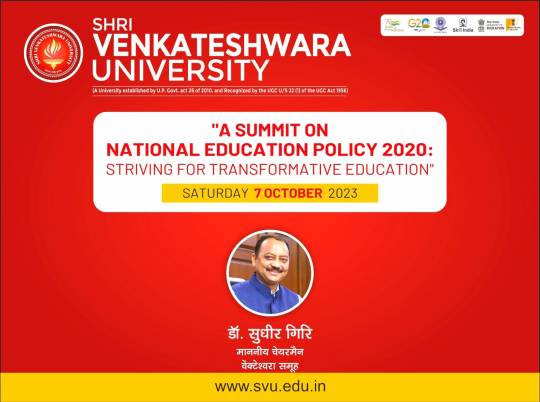



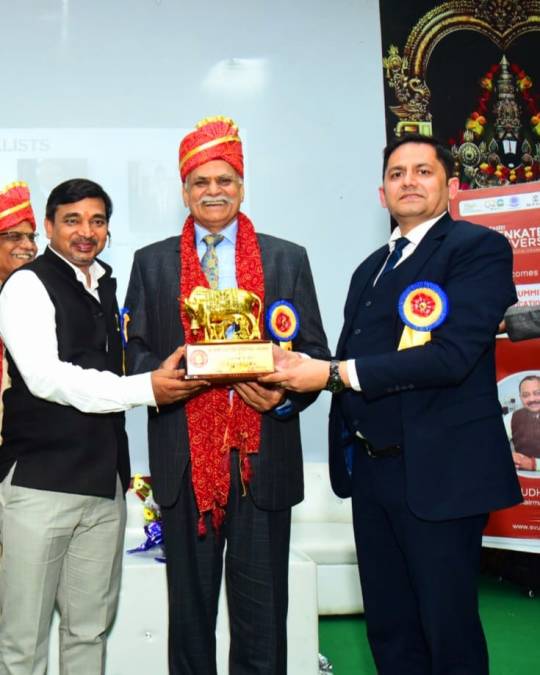
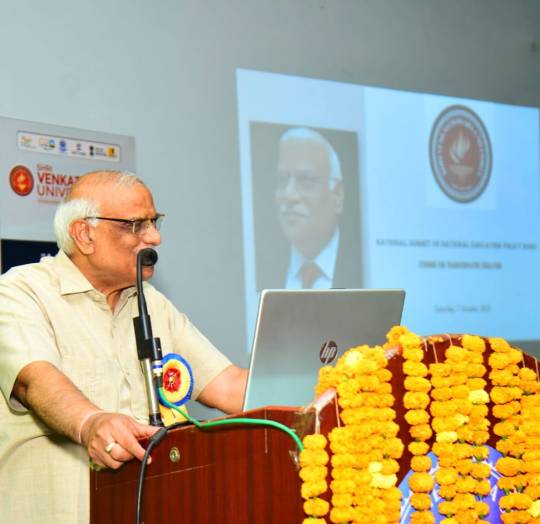
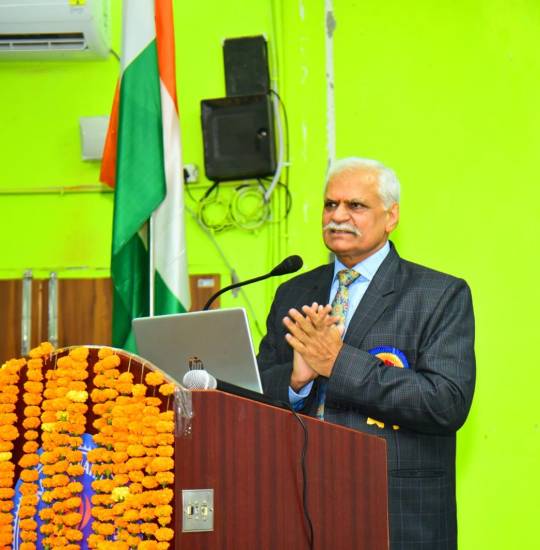

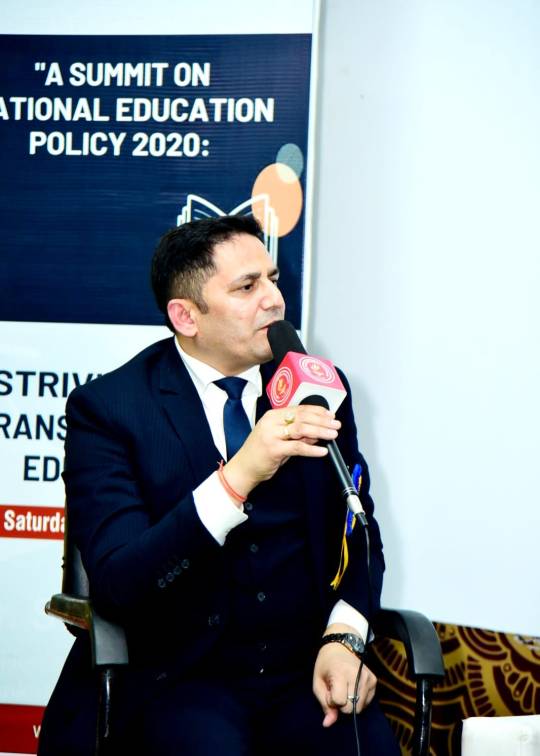
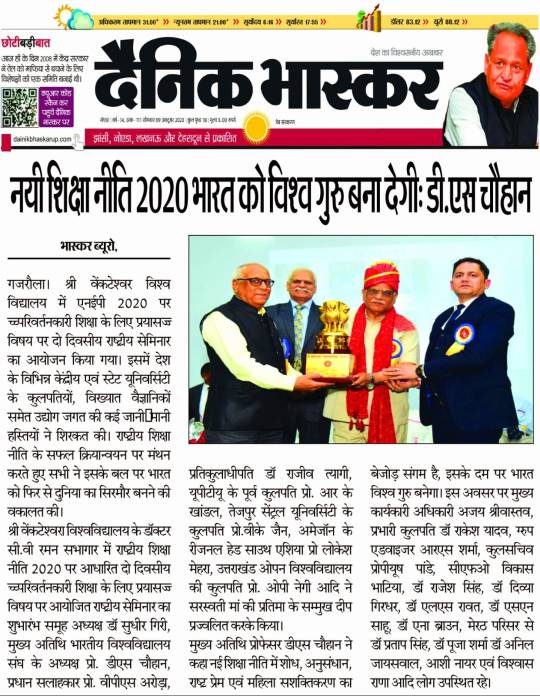
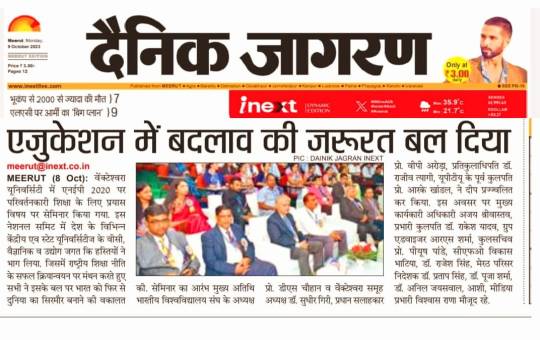
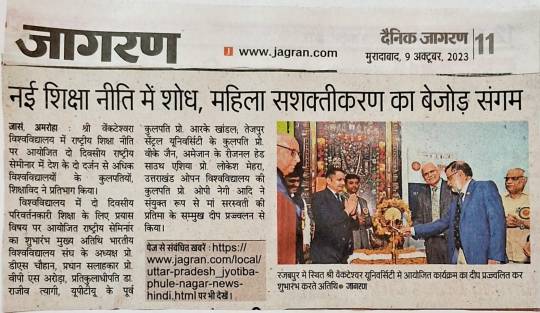
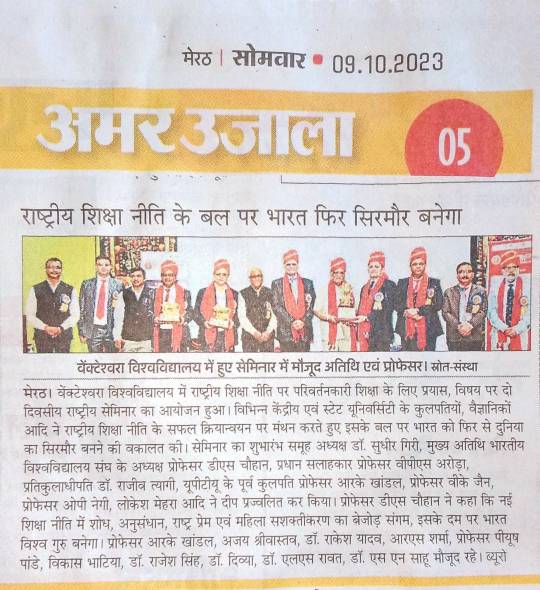
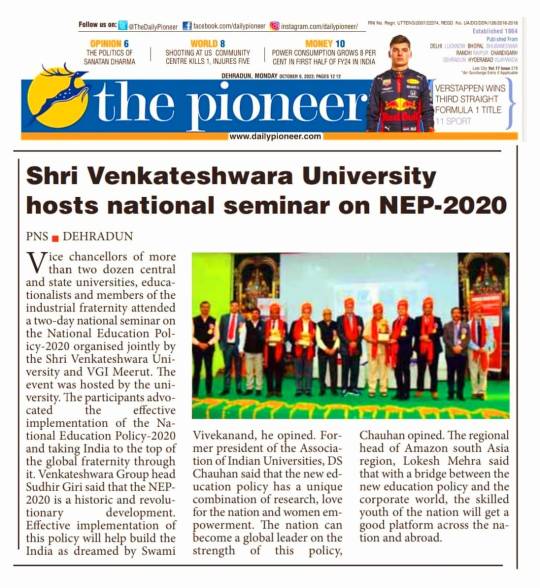
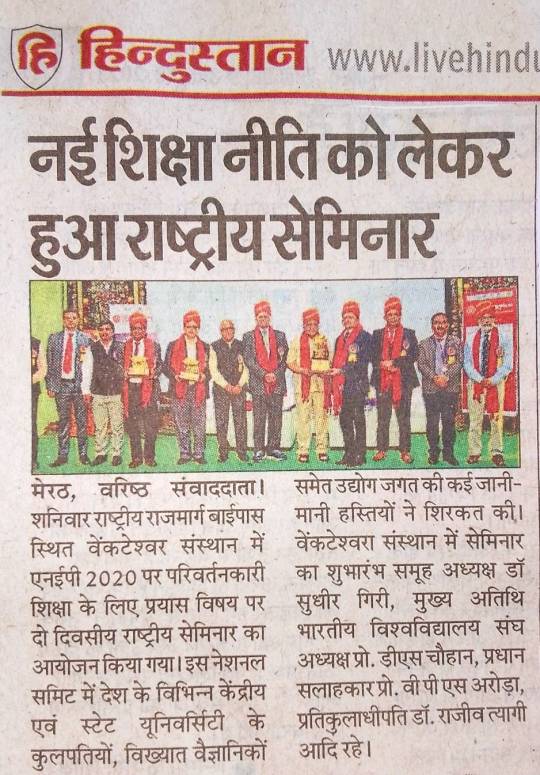
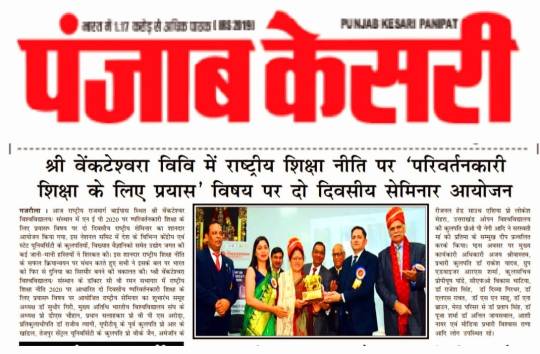

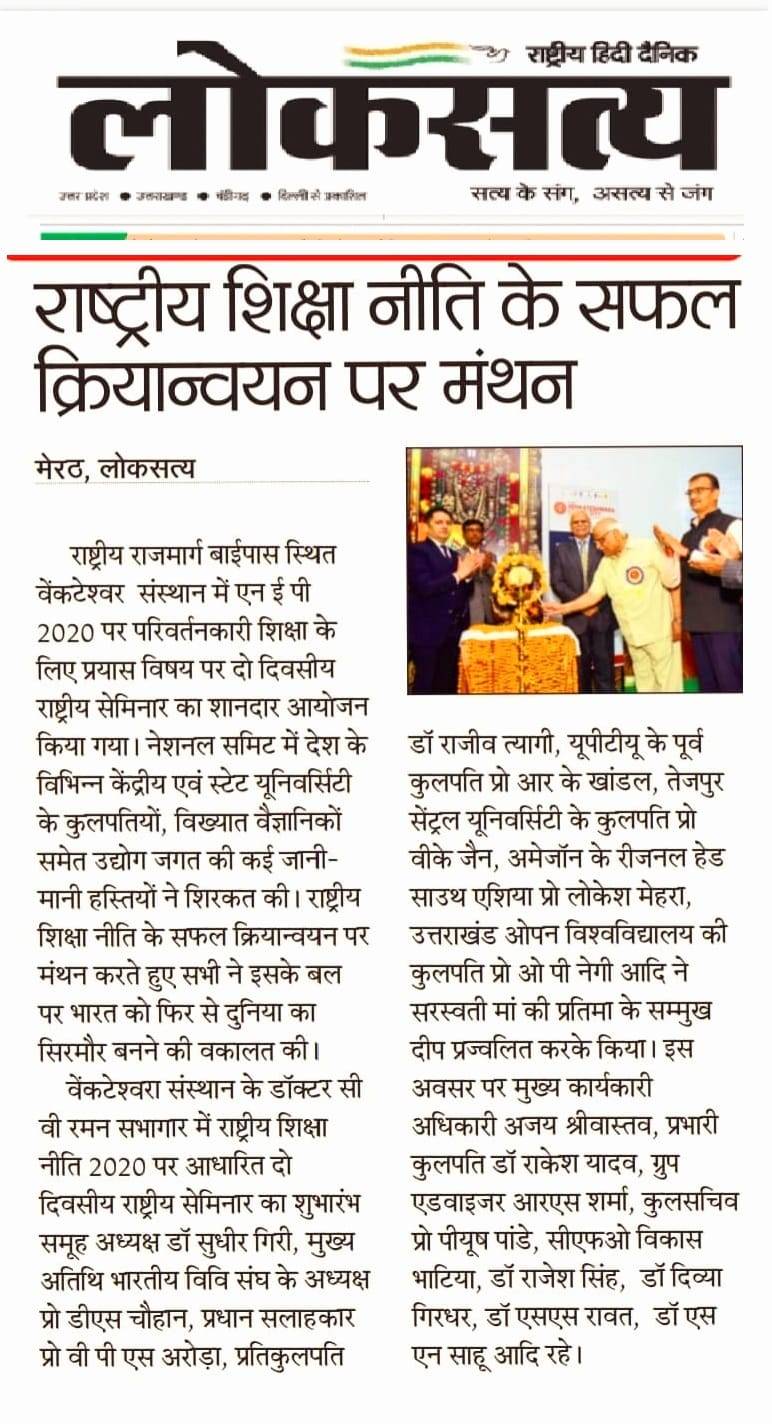
Shri Venkateshwara University hosted a 2-day summit on NEP 2020 Striving for transformative education.
Notable attendees included VCs of central and state universities, scientists, and corporate dignitaries.
All advocated that by implementing NEP 2020 successfully, India will once again become a world leader.
The Group Chairman Dr Sudhir Giri, President Association of Indian Universities (AIU) & the CG Prof. DS Chauhan, Chief Advisor Prof. VPS Arora & the Pro Chancellor Dr Rajiv Tyagi inaugurated the NEP 2020 Striving for Transformative education summit by lighting a lamp to Goddess Saraswati.
Former VC UPTU Prof RK Khandal, VC of Tezpur Central University Prof VK Jain, Amazon’s Regional Head for South Asia Mr. Lokesh Mehra, and the VC of Uttarakhand Open University Prof OP Negi were present to inaugurate the education summit.
The Group Chairman Dr Sudhir Giri reiterated the NEP 2020 is historic & revolutionary, it will pave the way for a new India as envisioned by Swami Vivekananda.
Prof DS Chauhan, an esteemed former VC of many universities, believes the NEP 2020 will make India a world leader through its focus on research, nationalism, and women's empowerment.
Prof. RK Khandal believes that the NEP 2020 provides great opportunities. However, he emphasizes the need for a joint effort to ensure its effective implementation and maximize the benefits for the end user.
Mr. Lokesh Mehra from Amazon stated the NEP will connect the corporate and academic worlds. It will also create abundant opportunities for skilled youth in India and abroad.
Those present included the CEO Mr. Ajay Shrivastava, VC Dr Rakesh Yadav, Group Advisor Mr. RS Sharma, Registrar Dr Piyush Pandey, CFO Mr. Vikas Bhatia, Dr Rajesh Singh & Dr Divya Girdhar.
Dr LS Rawat, Dr SN Sahu, Dr Ana Brown, Dr Pooja Sharma, Dr Anil Jaiswal & Aashi Nair were all present.
Also gracing the occasion was the Meerut Campus Director Dr Pratap Singh & also present was the Media In charge Mr. Vishwas Rana among others.
#best private university#university#moradabad#gajraula#shri_venkateshwara_university#best private university in india#svu#uttarpradesh#ph_d
0 notes
Link
Delhi is known for its bustling streets and chaotic traffic. But what's lesser known is that the city is also home to a rising number of headache and migraine sufferers.
According to a recent study, the number of people suffering from headaches in Delhi has increased by 20% in the last year. And migraines are on the rise too, with a reported 30% increase in sufferers.
0 notes
Text
0 notes
Text
Don’t Let Your Spine Problem Control Your Life – Get Help Today!
If you suffer from spine problems, you may feel like your life is out of control. Pain can make it hard to do the things you enjoy, and it can be tough to stay positive when you're in constant discomfort.
But it's important to remember that you can still live a full and happy life despite your spine problems. There are ways to manage your pain and keep your spine healthy, so don't let your condition control your life. Work with your doctor to create a treatment plan that works for you, and take steps to maintain a healthy lifestyle. With the right support, you can live a fulfilling life despite your spine problems. Let’s read about this in detail.
Symptoms of Spinal Problems
Spinal problems can cause a lot of pain and discomfort. Some common symptoms include:
Pain in the neck, back, or legs
Difficulty moving or walking
Numbness or tingling in the arms or legs
Weakness in the arms or legs
Loss of bladder or bowel control
Spinal problems can often be treated successfully if they are caught early.
Causes of spinal problems
There are many different causes of spinal problems. One common cause is an injury to the spine. This can happen from a fall, a car accident, or other type of trauma. Degenerative diseases such as osteoarthritis and degenerative disc disease can also lead to spinal problems. Congenital conditions such as scoliosis can also cause spinal problems. In some cases, the exact cause of the problem is unknown.
Spinal problems can be very painful and can limit a person's ability to move and function normally. Treatment depends on the cause of the problem and may include rest, ice, heat, physical therapy, medications, surgery, or other interventions.
Diagnosis
A spine problem can be diagnosed through imaging tests and a physical examination. Your doctor will review your medical history and symptoms, and then conduct a physical examination. They may also order imaging tests, such as an X-ray, MRI, or CT scan, to get a better look at your spine. Once the diagnosis is made, your doctor will develop a treatment plan to address your specific needs.
Treatments available
There are many different ways to treat spinal problems. Medication can be used to help relieve pain and inflammation.Physical therapy can help to gradually encourage the muscles in the spine to regain flexibility.. Surgery may be necessary to correct any structural problems with the spine. In some situations, a combination of these methods may be carried out.
No matter what treatment method is used, it is important to get an accurate diagnosis from a qualified healthcare professional. This will help to ensure that the best possible care is received. With proper treatment, most people with spinal problems can lead relatively normal lives.
How to prevent spinal problems?
Most spinal problems can be prevented with regular exercise and good posture. For example, regular aerobic exercise strengthens the muscles that support the spine and helps to maintain healthy joints.
Good posture habits, such as standing up straight and sitting with the shoulders back, help to reduce unnecessary strain on the spine.
If you have a job or hobby that requires you to sit or stand for long periods of time, make sure to take breaks often to move around and stretch. By taking some simple preventive measures, you can greatly reduce your risk of developing spine problems.
If you're dealing with a spinal problem, you know how much it can affect your life. The pain can be debilitating, and it can make it difficult to do the things you love. Don't let your spine problem control your life - get help today from Dr. VK Jain, the best spine specialist in India.
Dr. Jain has helped countless patients find relief from their spinal problems. He strives to use the latest techniques in order to provide patients the most effective care possible. Schedule an appointment today!
TAG : Spine Specialist in India, Spine Surgeon in India, Best Spine Surgeon in India, Spinal instrumentation surgery India
#Dr. vk Jain#Best Spine Surgeon in India#Spine Specialist in India#Spinal instrumentation surgery India#Spine Surgeon in India#Spinal Instrumentation Surgery In India
0 notes
Text
Myths & Facts about Epilepsy by Dr. Vijendra Kumar Jain
Epilepsy is a neurological disorder that affects people of all ages. It is characterized by recurrent seizures that can vary in severity. Although there is no cure for epilepsy, it can be managed with medication and other treatments. There are many myths and misconceptions about epilepsy, which can lead to misunderstanding and stigma. In this article, Dr. VK Jain, one of the best neurosurgeons in Delhi, India, debunks some of the most common myths about epilepsy.
Myth #1: If you’ve had a seizure, you have epilepsy.
Fact: A seizure is not always indicative of epilepsy. In fact, many people have one seizure in their lifetime and do not develop epilepsy. So, if you have had a seizure, it does not mean that you necessarily have epilepsy. However, if you have had more than one seizure or if your seizures are particularly severe, then it is more likely that you have epilepsy. If you think you may have epilepsy, it is important to see a doctor so that you can get the proper diagnosis and treatment.
Myth #2: People with epilepsy are mentally ill or emotionally unstable.
Fact: Despite what many people believe, epilepsy is not a mental illness. Epilepsy is a neurological disorder that affects the brain. People with epilepsy may have seizures, but they are not mentally ill or emotionally unstable. People with epilepsy are more likely to have mental health problems because of the stress of living with a chronic disorder. But having epilepsy does not make someone automatically mentally ill or unstable. With proper treatment and support, people with epilepsy can live full and happy lives.
Myth #3: People with epilepsy aren’t as smart as other people.
Fact: There is a common misconception that people with epilepsy are not as intelligent as those without the condition. This could not be further from the truth. People with epilepsy are just as smart and capable as anyone else.
There are many famous people with epilepsy who have gone on to lead successful lives, such as Julius Caesar, Napoleon Bonaparte, Vincent Van Gogh, and Lewis Carroll. These examples show that having epilepsy does not make someone less intelligent.
Myth #4: People who have seizures can’t handle high-pressure, demanding jobs.
Fact: Seizures are often thought of as a debilitating condition that can prevent people from leading a normal life. This includes holding down a job. However, there are many people with seizure disorders who lead very successful careers in high-pressure, demanding fields.
While it is true that some seizure disorders can be very difficult to manage, many people with seizures are able to control their condition with medication and other treatments. In addition, many employers are now more understanding and accommodating of employees with medical conditions like seizures.
So if you or someone you know has a seizure disorder and is looking for employment, don't let the fear of having a seizure hold you back from pursuing your dream job.
Myth #5: Epilepsy is most common in children.
Fact: Epilepsy is one of the most common neurological disorders, affecting people of all ages. Though it is often thought of as a disorder that primarily affects children, epilepsy can occur at any age.
Myth #6: It’s easy to tell when a seizure is about to happen.
Fact: Seizures are often unpredictable, and it can be difficult to tell when one is about to occur. Seizure warning signs vary from person to person, and some people may not experience any warning signs at all.
If you have seizures, it is important to work with your doctor to develop a seizure management plan. This plan may include taking medication, avoiding triggers, and knowing what to do during and after a seizure.
Myth #7: You should force something into the mouth of someone having a seizure.
Fact: There is a common misconception that if someone is having a seizure, you should try to force something into their mouth. This is actually a dangerous myth. Seizures involve uncontrolled muscle movements, which means that forcing something into the mouth could cause them to choke. Additionally, during a seizure, a person may lose consciousness and be unable to swallow properly, which could lead to aspirating whatever you’ve placed in their mouth.
Myth #8: People with epilepsy will pass it on to their kids.
Fact: Epilepsy is not contagious and cannot be passed on to children. However, it can be inherited. If you have epilepsy, there is a greater chance that your children will also have the condition. Epilepsy is believed to be due to a combination of genetics and environmental factors.
Myth #9: You can’t live a full, normal life with epilepsy.
Fact: Epilepsy is often thought of as a disease that severely limits a person’s quality of life. But this simply isn’t true. With the right treatment and support, people with epilepsy can live full, normal lives.
Myth #10: Women with epilepsy can’t or shouldn’t get pregnant.
Fact: Some people believe that the seizures that come with epilepsy can harm the developing baby or lead to complications during pregnancy. However, many women with epilepsy have healthy pregnancies and healthy babies.
With proper medical care, women with epilepsy can have a successful pregnancy. There are some risks associated with epilepsy and pregnancy, but these risks can be managed with the help of a healthcare team. It’s important to work closely with your doctor to ensure that you are taking the necessary precautions for a healthy pregnancy.
In conclusion,it is important to remember that epilepsy is a serious neurological disorder that can have a profound impact on a person’s life. However, with proper treatment and support, people with epilepsy can lead full, productive lives. If you or someone you know has epilepsy, don’t hesitate to seek out resources and information to help manage the condition.
Dr. VK Jain has been treating patients with epilepsy for over 41 years. He is a leading expert in the field and has helped many people manage their condition.Dr. Jain’s approach to treatment focuses on helping patients control their seizures and improve their quality of life. He offers the latest medication and surgical options, as well as counseling and support for patients and their families.
TAG- Best spine surgeon in Delhi, Best Neurosurgeon in Delhi, Spine specialist in Delhi, Best Brain tumor surgeon in Delhi
#bestneurologistinindia#bestspinesurgeoninindia#bestbraintumorsurgeon#spinalinstrumentationsurgery#spinespecialistindelhi
0 notes
Text
Best Neurosurgeon and Spine Surgeon in India By Dr. Vk Jain
Dr. Vijendra Kumar Jain is a renowned neurosurgeon in India with more than 41 years of experience in the field of neurosurgery. He is the Principal Director of Neurosurgery and Spine Surgery Department at Max Hospital in Delhi and NCR region. Dr. Jain has performed over 16,000 surgeries and has received several awards and accolades for his work.
He is known for his surgical precision and his expertise lies in treating brain tumors, aneurysms, strokes, spinal cord injuries, and other disorders related to brain and spine. Patients from all over the world travel to India to seek his expertise in neurosurgery. In addition to his clinical work, Dr. VK Jain is also involved in research and teaching. He has published numerous papers in peer-reviewed journals and he has been an invited speaker at national and international conferences. His vast clinical experience and innovative surgical techniques make him one of the best neurosurgeons in India.
Our Services
Neuro & Spinal Services
Neuro and spinal surgeries are some of the most complex procedures a doctor can perform. We provide a wide range of neuro and spinal surgeries to meet the needs of our patients.
Spinal Instrumentation
Spinal instrumentation is used to maintain spine stability and rigidity after spine fusion surgery, with the usage of metal fixators.
Cerebrovascular Surgery
Strokes can be prevented! Cerebrovascular Surgery is a treatment for numerous conditions of the brain, including stroke prevention.
Brain Tumor Surgery
Our surgeon is experienced in treating all types of brain tumors, so you can be sure you're getting the best possible care.
Spine Surgery
Our minimally invasive spine surgery is faster, safer and less painful than traditional spine surgery.
Intraventricular Tumour Surgery
Intraventricular Tumor Surgery is performed to treat tumors that are located in the ventricles of the brain.
Why Choose Dr. VK Jain ?
Dr. VK Jain is a highly experienced and qualified neurosurgeon in India who offers his patients the best possible care.
He has a wealth of knowledge and expertise in the field of neurosurgery and is always up-to-date with the latest treatments and procedures.
He has a friendly and approachable manner, which puts his patients at ease and makes them feel comfortable discussing their health concerns. He is always available to answer any questions or concerns that his patients may have, and strives to make sure that they are completely comfortable and informed about their treatment options.
He has performed countless successful surgeries and has a proven track record of providing exemplary care to his patients. He is passionate about his work and takes great pride in helping others. His patients are his number one priority, and he always puts their needs first. He's dedicated to the health and well-being of his patients.
Tags= Best Spine Surgeon in India, Spine Surgeon in India, Neurosurgeon in India, Best Brain Tumor Surgeon in India, Spine Specialist in India.
#Best Spine Surgeon in India#Spine Surgeon in India#Neurosurgeon in India#Best Brain Tumor Surgeon in India#Spine Specialist in India
0 notes
Link

Chirurgie de la jonction craniocervicale par le meilleur neurochirurgien en Inde: le Dr VK Jain. Lire la suite: https://bit.ly/2WESwE5 Appel: +91-9325887033 Courrier: [email protected] Visite: https://bit.ly/2MLsIX0
"Dr VK Jain meilleur neurochirurgien au Max Healthcare Delhi" "Rendez-vous en ligne du Dr V k Jain"
0 notes
Text
Nearly two months after Delhi govt caps COVID-19 treatment prices, patients complain of overcharging by private hospitals
On 20 June, the Delhi government issued an order capping prices for COVID-19 treatments in private hospitals “with the proviso that all COVID-19 beds would be at rates given by the committee (formed under NITI Aayog member Dr VK Paul) subject to upper limit of 60 percent of the beds of total hospital bed capacity".
According to the order, the prices for all National Accreditation Board for Hospitals & Healthcare Providers-accredited hospitals were to be capped at Rs 10,000, Rs 15,000, and Rs 18,000 for isolation beds, ICU beds without ventilators, and with ventilators support, respectively.
Similarly, for all non-NABH accredited hospitals, the prices were Rs 8,000, Rs 13,000, and Rs 15,000, respectively.
The order clarified further: "The rates for private hospitals beds would be all inclusive as a package. This will include, but not limited to: bed, food and other amenities, monitoring, nursing care, doctors' visits/ consults, investigations including imaging, treatment as per the national protocol for COVID-19 care and standard care for co-morbidities, oxygen, blood transfusion, etc.”
Despite the order, private hospitals have continued to not only violate the norms, as the following case studies show, they have often been kept in dark about the scheme.
The authorities, for their part seem reluctant to fix the flaws in the government order or take the violators to task as issues remain despite repeated interventions from civil society organisations.
Caught between insurance provider, hospital
On 20 June, 60-year-old Tarun Lata was admitted to Shri Moolchand Kharaiti Ram Hospital and Ayurvedic Research Institute, a NABH-accredited facility for COVID-19 with left side pneumonia and pleural effusion. After being kept in an isolation ward for 10 days, Lata was billed Rs 2,59,348.
The hospital bill included an average cost of PPE kits at Rs 4,477 per day and oxygen charges for nine days at the rate of Rs 1,400 per day even though she was not even administered oxygen.
When Lata's son Nitin Gulati objected to the bill and asked the hospital to charge as per the rates fixed by the Delhi government, the hospital claimed the order was passed a day after Lata was admitted to the hospital.
His father and brother also tested COVID-19 positive and were under home isolation.
“It was a very traumatic situation for me, running between my mother in hospital and two other family members at home, and then there was this fiasco with the hospital,” said Gulati.
On 8 August, when I spoke to people in the cash counter and the admission department, and the billing department, they said that Lata’s case was to be charged under insurance and not the Delhi government price capping.
The front desk executive then called back to give me email addresses to write to.
“Please send us your queries again. Our senior team will have to discuss and revert accordingly,” the executive said.
In the meantime, the hospital had already sent a response on the case on 7 August denying these charges.
Dr Madhu Handa, medical administrator, wrote that the billing was done as per the agreement between the hospital and the insurance company.
The Delhi government order, however, lays down no special exceptions for insurance cases.
Gulati explained that he sought help from the corporate insurance cover provided by his employer.
He says that there was a tussle between the hospital and the insurance company over the bill. At first, the insurance company had said that they would pay as per the Delhi government price capping only, and refused to adhere to the full billing, informed Gulati.
The hospital, however, refused to budge. As a result, the insurance covered only Rs 1.02 lakh of the bill. After Gulati's employer approached the insurance company, an additional Rs 80,000 was added to the amount covered.
“That still meant an out of pocket expenditure of Rs 80,000. But, the larger issue is that the hospital never bothered to inform us properly about the Delhi government price capping, let alone implement it,” said Gulati.
Lata's is not the only case involving overcharging by Delhi hospitals, though.
Representational image. AP
Selective redressal
Nitin Kumar, 22, had to take up against three different hospitals: Max Super Speciality Hospital Saket (East Block), Goyal Hospital and Urology Centre, and Max Smart Super Speciality in Saket over rampant overcharging.
He and his mother Binney Rani tested COVID-19 positive while the rest of their family was in isolation.
"It was difficult to continue challenging the hospitals in that situation,” he said.
Kumar noted that he was administered FabiFlu at Max Super Speciality Hospital without his informed consent.
“Even though I consumed FabiFlu for only two days (26 tablets in total), I have been charged for two boxes of the medicine (34 tablets each). I was not given any of the medicine to take home when I was discharged,” he said, adding that he had been charged Rs 6,998.
“This was all via Whatsapp!” he added and recalled that he repeatedly refused to give consent to these practices of the hospitals.
Additionally, he had also been charged for medicines and investigations that are a part of the standard care for COVID-19 patients at Rs 2,185.50 and Rs 8,850, respectively.
Kumar’s grievances with Max Super Speciality Hospital were drafted and sent as a complaint letter to the hospital authorities as well as members of the state and central health departments.
In fact, on 1 August, Arti Ahuja, additional secretary (MoHFW) forwarded Nitin’s petition against Max Super Speciality Hospital to Vikram Dev Dutt, principal secretary (Delhi HFW) urging him to "enquire into the matter and take appropriate action".
Thereafter, the hospital took cognisance of this and refunded the overbilled amount. The hospital asked him to sign a non-disclosure agreement, which he had reservations against doing and thus only gave only a written acknowledgement instead.
The complaints regarding Kumar's mother’s treatment charges at Max Smart Super Speciality Hospital, Saket (East Block) and Goyal Hospital and Urology Center, however, have still not been acknowledged.
She was overbilled Rs 75,947 at Max Smart, and Rs 28,000 on a COVID-19 package along with an arbitrary pricing of Rs 4,000 for ambulance transfer at Goyal Hospital.
On 30 July, when this author spoke to Shaleen Mitra, the OSD to Delhi health minister Satyendar Jain, he was not aware of these complaints sent to his department and requested that these be forwarded to him again.
On 4 August, Mitra replied that “Nitin's payment was returned by the hospital”. However, he gave no acknowledgement of the complaints about overcharging in Nitin's mother's medical bills.
Tanushree Roy Chowdhury, the deputy general manager, corporate communications and public relations of Max Healthcare, initially said the complaint was resolved.
Then on 1 August, Chowdhury replied again saying she would look into the matter after the 'long weekend'. There has been no response.
Pay or take the patient out
Mayanka Sanghotra’s mother Narender Kaur breathed her last on 17 July in Shanti Mukand Hospital. Kaur was admitted there since 24 June after being diagnosed as COVID-19 positive. This hospital too didn't inform Mayanka of the government orders, and asked her to pay for a COVID-19 package of Rs 4 lakh instead.
Later, she was asked to procure three injections costing Rs 40,000 each and six vials of remdesiver which is really not easy to find.
“When I went to search for remdesiver outside, there was so much blackmarketing happening! The prices ranged from Rs 30,000 to Rs 80,000. And, the doctors had asked for six vials of the medicine,” she said.
Malini Aisola from All India Drugs Action Network (AIDAN) said, "The (20 June) order does mention an exclusion from the rate caps for experimental therapies such as remdesivir and tocilizumab which can be charged separately. Similarly, the IL-6 test and COVID-19 diagnostic test are also excluded from the package rates. However, in spite of the order, hospitals have been tacking on charges for both medicines routinely used in COVID-19 treatment and for investigations and baseline tests that should have been included in the package. We have observed these violations repeatedly and in numerous private hospitals.”
When Mayanka was informed that the bills had exceeded Rs 7.5 lakh by 5 July, she was worried. She looked around for help and managed to contact Amresh Kumar, the Aam Aadmi Party, as well as Malini.
When conversations did not seem to yield results, she wrote a complaint letter on 11 July. On 14 July, when she went to speak to the authorities about the complaint, Malini accompanied her.
Dr Tejender Pal, a physiotherapist, and Dr Samrul Hoda, from the billing department, said that that these escalations would make no difference.
Mayanka claims that on On 17 July, Dr Hoda told her on a phone call to “either arrange the payment" or she could "take the patient out of this hospital".
Later that day, Mayanka received another call from the billing department saying that the hospital has finally agreed to revise her bills according to the government capping. The issues in her mother's medical bills were settled, but two hours later, the hospital informed Mayanka that her mother's condition was unstable. Kaur was declared dead by 9.30 pm that night.
On 26 July, the hospital directed this reporter to Dr Hoda for a statement about the overbilling in this case, however, he said that he couldn't discuss the details.
He further added that he does not particularly remember this case, and did not have access to the records as it was a weekend. He promised to get in touch with further details later.
On 7 August, he informed that he was not authorised to talk about these things, but still explained: "The patient had agreed to pay the hospital rates and was not admitted as a government category. It might have happened that they ran out of money later, and hence started saying that they want the government prices.”
He also informed that though a certain undertaking exists, access to that document is restricted to me as well as the patient’s family.
“It is a hospital document, after all. We can only hand it to authorised persons,” he said.
Representational image. AP
Month after order, issues remain
On 23 June, several CSOs including AIDAN, Jan Swasthya Abhiyan (JSA), and twenty five others wrote to authorities welcoming the order capping prices for COVID-19 treatments and suggested immediate action points.
The capping restriction to only 60 percent of the beds seemed “arbitrary and incomprehensible” to them, and they suggested that this provision be extended to “all persons accessing treatment through private hospitals, and who are not covered under any laws or schemes that guarantee free treatment."
They also said that the order must apply to all COVID-19 patients including those who currently admitted and undergoing treatment in private hospitals.
In a press conference on 25 July, Inayat Singh Kakar of People's Health Movement noted that there has been no transparency or political will to implement the order.
On 25 July, these CSOs also organised a virtual press conference highlighting the continued violations of the order by private hospitals. They released another letter that highlighted problems in implementation and suggested remedial measures to the authorities.
The above mentioned testimonies are just the tip of the iceberg. More than a month after the order was passed and subsequent interventions from the CSOs, issues remain.
Crumbling infrastructure
According to the National Health Accounts estimates, released in March 2019, patients in India bear about 61 percent of the total health expenditure. The government’s health expenditure stands at an abysmally low 30.6 percent.
The Economic Survey 2020 shows that the government expenditure on healthcare was 1.6 percent in FY20 budget, a minuscule change from 1.5 percent in FY19. The National Health Policy, 2017, has recommended that health expenditure by the government should be 2.5 percent of GDP by 2025.
A 2018 study which analysed the financial burden of households’ out-of-pocket payments on medicine in India over a period of 2o years between 1994 and 2014 found that 3.8 crore Indians fell below the poverty line due to spending on medicines alone.
Jashodhara Dasgupta, from Sahayog, a non-profit voluntary organisation, explained how the term "out of pocket expenditure" concealed quite a few crucial facts about medical costs in India.
“Our public healthcare is immensely under-resourced and almost dysfunctional. In contrast, the private hospitals do have substantially more resources — both in terms of infrastructure as well as number of doctors. In times of a crisis like the pandemic, the people will be compelled to go to private hospitals,” she says.
Dasgupta informs that private hospitals function primarily with the support of private insurance and State-funded insurance companies, which allows them to hike prices astronomically.
She lays out two scenarios: “You see, when a minister gets admitted in a private hospital, the government covers the costs of that treatment, right? We, the taxpayers, pay for the treatment in private hospitals. The second situation is when corporate employees or PSU employees go to private hospitals, there’s the safety net of employer paid insurance. Concurrently, in both the cases, private hospitals use this to their advantage and their prices are hiked up astronomically.”
While the Delhi government did put together an order to contain some of the issues plaguing the private healthcare sector, the political will to implement it seems to be lacking.
When Amresh was approached about Mayanka’s case on 6 August, he said that he has followed the usual process of putting the patient in touch with the DMS of the hospital.
While that is an essential step, it still leaves the patient trying to fight for his or her rights against the hospital.
via Blogger https://ift.tt/3gJTlGn
0 notes
Text
Spine surgery done by the best Spine Surgeon in India - Dr. V.K Jain
Spine surgery is a type of back surgery that is used to treat conditions that affect the spine. These conditions can include a herniated disc, spinal stenosis, sciatica etc. Spine surgery may be recommended if other treatments such as medications or physical therapy do not provide relief from symptoms.
The Structure of the Spine
Our spine is made up of 33 vertebrae. They are divided into five regions: 7 cervical vertebrae in the neck, 12 thoracic vertebrae in the chest, 5 lumbar vertebrae in the lower back, 5 fused sacral vertebrae in the pelvis, and 4 fused coccygeal vertebrae in the tailbone. The first cervical vertebra is called the atlas and supports your head. The second cervical vertebra is called the axis and allows your head to turn. The spinal cord passes through a bony canal in the center of each vertebra. A disc of cartilage separates each pair of spinal nerves as they exit the spinal cord.
The most important part of the body is spine. It helps you stand up straight, and it protects your spinal cord. The spinal cord is a bundle of nerves that travels down your back. It controls all the movement and feeling in your body below your neck. If something happens to your spine, it can cause major problems.
What conditions of the spine would require surgery?
Spine surgery is typically suggested for those with severe conditions that have not responded to other treatments. Here are some of the conditions that would require spine surgery:
Disc Degeneration: Disc degeneration is a condition that affects the discs in your back. These discs help to cushion your spine and keep it healthy. When they degenerate, they can no longer do their job properly and may cause pain or other problems. There are several things that can lead to disc degeneration, including age, injury, and genetics. If you are experiencing back pain, it is important to see a doctor to determine if disc degeneration is the cause. There are treatments available that can help to improve your symptoms.
Disc Herniation: Disc herniation is a condition caused by the displacement of the intervertebral disc. This may lead to compression of the spinal cord or nerve roots. Symptoms vary depending on which nerves are compressed, but may include pain, numbness, and tingling in the extremities. Disc herniation surgery is usually recommended when conservative treatments, such as medication and physical therapy, have failed to improve symptoms. The surgery involves removing the portion of the disc that is protruding and relieving any pressure on the nearby nerves.
Spondylolisthesis: Spondylolisthesis is a condition in which one of the vertebrae slips out of place. This can cause pain and stiffness in the back, and may make it difficult to stand or walk. The condition is typically treated with surgery, but in some cases, nonsurgical methods may be effective.
Osteoarthritis: Osteoarthritis is a type of joint disease that results from the deterioration of the cartilage. Cartilage is a tough, elastic tissue that covers the ends of bones in a joint. Osteoarthritis most often affects the hands, knees, hips, and spine. The symptoms of osteoarthritis include pain, stiffness, and a decreased range of motion in the affected joint. In severe cases, bone spurs may form on the edges of the joint, and inflammation may occur. There is no cure for osteoarthritis, but treatment options are available to help relieve symptoms. These treatments include medications such as pain relievers and anti-inflammatory drugs, physical therapy, and surgery in cases of severe damage to the joint.
Spinal canal stenosis: Spinal canal stenosis is a condition that affects the spinal cord. This condition is caused by a narrowing of the spinal canal, which can put pressure on the spinal cord. This pressure can cause pain, numbness, and tingling in the arms and legs. The most common cause of spinal canal stenosis is arthritis, which can lead to bone spurs that narrow the space available for the nerves. Other causes of spinal canal stenosis include tumors, herniated discs, and thickening of the spinal cord or its coverings.Treatment for spinal canal stenosis may include surgery or medication.
Different Types of Spine Surgeries
There are many different types of spine surgeries that can be performed to treat various disorders and injuries. Some common spine surgeries include:
Pedicle Screw Fixation: Pedicle screw fixation is a surgical procedure used to stabilize the spine. The screws are inserted into the vertebrae and then attached to a metal rod or plate. This procedure can be used to treat spinal fractures, instability, and deformities.
Fusion Surgeries: Fusion surgeries are a common treatment for spine conditions. The goal of a fusion surgery is to join two or more bones together so that they can heal into one solid unit. This can help to relieve pain and improve function. Fusion surgeries are most commonly used to treat conditions such as: Spinal stenosis, Spondylolisthesis, Herniated disk etc.
Microdiscectomy: Microdiscectomy is a surgical procedure that is used to remove a small piece of herniated or ruptured disk from the spine. The surgery is minimally invasive, and can often be performed on an outpatient basis. Microdiscectomy has been shown to be effective in relieving pain and restoring function in patients with a herniated disk.
Minimally invasive spine surgery (MISS): Minimally invasive spine surgery (MISS) is a type of surgery that is used to treat various conditions of the spine. MISS is a less invasive alternative to traditional open spine surgery. MISS involves making smaller incisions and using specialized instruments and techniques to treat the condition. MISS has been shown to be safe and effective for many conditions of the spine.
Foraminotomy: Foraminotomy is a surgical procedure that is used to remove bone spurs or other obstructions from the foramen magnum, which is the opening in the base of the skull that allows the spinal cord to exit. This procedure can be performed using either an open or a minimally invasive approach. Foraminotomy may be recommended for patients who are experiencing nerve compression or spinal cord compression caused by a bone spur or other obstruction.
Vertebroplasty and Kyphoplasty: Vertebroplasty and Kyphoplasty are minimally invasive procedures used to treat pain from vertebral fractures. Vertebroplasty is the injection of bone cement into a fractured vertebra, while Kyphoplasty is the same procedure but also includes the inflation of a balloon to restore height and alignment to the vertebra. These procedures can provide significant relief from pain for many patients and are relatively safe, with few complications.
Tag = best Spine Surgeon in India, Spine Specialist in India
For More Information https://www.brainspineneurodelhiindia.com
#best Spine Surgeon in India#Spine Specialist in India#Dr. VK Jain#Dr. Vijendra Kumar Jain#brainspineneurodelhiindia
1 note
·
View note
Text
Endoscopic Skull Base Surgery
Endoscopic Skull Base Surgery is a minimally invasive surgical procedure that treats various conditions affecting the bones and tissues surrounding the brain.
This surgery is performed through small incisions in the skull, which allows the surgeon to access and remove tumors or other abnormal growths without damaging healthy tissue.
Endoscopic Skull Base Surgery is often used to treat conditions such as meningiomas, pituitary tumors, and skull fractures. This procedure can also be used to relieve pressure on the brain or spinal cord caused by conditions such as hydrocephalus.
Procedure: what happens during the surgery?
Endoscopic skull base surgery is a minimally invasive procedure used to treat various conditions of the skull base. The surgery is performed through small incisions in the nose and mouth. A thin, flexible tube with a light and camera is inserted into the incisions. The surgeon uses the camera to see inside the skull and remove or repair the tissue causing the problem.
Endoscopic skull base surgery is usually performed as an outpatient procedure, which means that you can go home the same day. The surgery usually takes two to four hours, but this depends on the condition being treated. Recovery time after endoscopic skull base surgery is typically short, with most people able to return to their normal activities within a week.
Benefits: why is this type of surgery beneficial?
Endoscopic skull base surgery has become the preferred method for many neurosurgeons when treating skull base tumors. This minimally invasive approach offers many benefits for both the patient and surgeon.
Endoscopic skull base surgery requires only small incisions, which results in less tissue damage and fewer complications. This type of surgery also allows the surgeon to directly visualize the tumor and surrounding structures, which helps to ensure that all of the tumor is removed.
Patients who undergo endoscopic skull base surgery typically have a shorter hospital stay and faster recovery than those who undergo traditional open skull surgery. Endoscopic skull base surgery is associated with less pain, bleeding, and scarring, and it often results in a better cosmetic outcome.
Risks: what risks are associated with this type of surgery?
Dr. VK Jain is a reputable neurosurgeon in India who specializes in endoscopic skull base surgery. He has performed hundreds of these procedures. He says that the most common complication he sees is bleeding, which can usually be controlled with medication or additional surgery. Other risks include infection, damage to nearby structures, and nerve injury.
Despite the potential risks, endoscopic skull base surgery is often the best option for patients with certain conditions affecting the skull base. Dr. Jain says that when performed by an experienced surgeon, the procedure is safe and effective.
Endoscopic Skull Base Surgery for Brain Tumor Treatment
Endoscopic skull base surgery (ESBS) is a minimally invasive approach for the brain tumor treatment in India. This surgical technique offers many advantages over traditional open surgery, including less tissue damage, lower risk of infection, and shorter hospital stay. ESBS has become the standard of care for many brain tumor patients in India.
Additionally, endoscopic surgery provides access to areas of the brain that are difficult to reach with traditional techniques. The role of endoscopic skull base surgery in the treatment of brain tumors will continue to grow as more surgeons are trained in this minimally invasive technique. This surgery provides patients with a safe and effective option for treating their tumor while minimizing the risk of complications.
Dr. VK Jain is an expert in endoscopic skull base surgery and has successfully treated many patients with this condition. He is the best neurosurgeon in India and has vast experience in this field. Book an appointment with him today.
TAG : best neurosurgeon in India, Neurosurgeon in India
For More Information:
https://www.brainspineneurodelhiindia.com/
#Dr. VK Jain#Best Neurosurgeon and Spine Surgeon in India#Spine Surgeon in India#spine specialist in india
0 notes
Video
youtube
Sh. Rohit Gupta (District Collector Kota) Releases Motivational Book “Meri Kitab Meri Dost” Written by Dr Vidushi Sharma “मेरी किताब मेरी दोस्त - छात्रों एवं युवाओं के लिए सफलता सन्देश” The Book Meri Kitab Meri Dost written by Dr Vidushi to motivate youth of India and even more importantly, to remain happy Meri Kitab Meri Dost, a motivational book for students and youth of India written by renowned ophthalmologist of the city, Dr. Vidushi Sharma Pandey (MD, AIIMS, FRCS UK) was released by the Kota District Collector, Shri Rohit Gupta, IAS on 12th August 2017. Many stalwarts of the medical and literary fraternity and coaching centres of Kota and were present during this book release programme held at the Conference Hall of SuVi Eye Institute & Lasik Laser Center,Kota. These include- Shri VK Bansal (Bansal Classes) and Shri Rajesh Maheshwari (Allen Classes), Shri Govind Maheshwari (Allen Classes), Shri Samir Bansal (Bansal Classes), Shri Nitin Vijay (Motion IIT), Shri Akhilesh Dikshit (Btrix Classes), Dr. S K Vijay (Akash Coaching), and Shri Mayank Joshi, Shri Lalit Vijay and Shri Jitendra Chandwani (Sarvottam Classes) and Nivesh Guru Pankaj Laddha. Many renowned doctors participated in this program including the Principal, Medical College, Dr. Girish Verma, Senior Physician of the city, Dr. A Q Khan, Medical Superintendent of MBS Hospital, Dr. P K Tiwari, Senior Paediatricians, Dr. C B Dasgupta and Dr. Ashok Sharda, Dr. Deependra Sharma (State IMA Vice president), Dr Gopal Singh Bhati (IMA state secretary), Dr. T C Acharya (Past President IMA Kota), Dr. K K Kanjoliya (President Eye Bank Society Rajasthan,Kota chapter), Dr. Saurabh Barthunia and Dr. Nidhi Barthunia, Dr. Sanjeev Saxena and Dr. Sanjay Soni. Also present at the occasion were Balkavi Aditya Jain, Author and entrepreneur Sachin Jha, Father C S Mathews, Mr. L C Baheti, Mrs. Shashi Agrawal, Mrs. Vandana Kaul and Shri Ishwar Sharma and Shri Anil Tiwari of Brahman Kalyan Parishad. Speaking on the occasion, the District Collector, Mr Gupta said that he has read the book himself, and found it extremely useful not just for students, but for all youngsters starting out in life. Shri V K Bansal of Bansal Classes said that he is happy to know that besides being an excellent doctor, Dr. Vidushi has written such a book for the youngsters, and he hoped it will prove to be very useful for them. Shri Rajesh Maheshwari of Allen Career Institute said that the title of the book is extremely appropriate, and any student who considers books as his/ her friend is sure to succeed in life. He also talked about the Plantation programme being carried out by Allen Classes, and plantation was also done after this program. Renowned author and poet Shri Ambika Dutt Chaturvedi said that he has read the book and found it quite engaging and interesting to read. He urged the author to continue writing on diverse topics, including those related to her professional field. The author Dr. Vidushi told the audience that more than a motivational book, this is a feel good book that inspires the youngsters to be happy through all their life struggles. It is a book that speaks to the readers like a friend, understanding their problems and giving them practical advice on dealing with these problems. This book Meri Kitab Meri Dost is published by Maple Press, Noida and available on Amazon and Flipkart. Sh. Bhuvnesh Gupta (Team Jeevan Datta) conducted the programm. Dr Suresh Pandey, (Director of SuVi Eye Institute) 49th birthday was also celebrated during this occasion by tree plantations. Dr Suresh Pandey thanked all the participants. “मेरी किताब मेरी दोस्त - छात्रों एवं युवाओं के लिए सफलता सन्देश” is a motivational book for youth and students written by renowned doctor Dr. Vidushi Sharma, MD (AIIMS, New Delhi), FRCS (UK), Director, SuVi Eye Institute, Kota, India. This motivational book published by Maple Press (Pblishing Division www.pblishing.com) is a collection of life lessons ranging from dealing with failure to developing a positive attitude and communication skills. Written in a very simple Hindi language that appeals to youngsters, it is especially useful for the Hindi speaking youth from small towns and cities as well as students preparing for competitive exams for IIT and Medical coaching in Kota, Rajasthan. Dr. Vidushi has written this book to motivate students and even more importantly, to remain happy. The main aim of author is to prevent depression and suicide among students. This book is also available on Amazon and Flipkart. Here is the link: http://www.amazon.in/Meri-Kitab-Dost-...
0 notes
Text
Symptoms, Treatment And Risk factors for headaches and migraines
Delhi is known for its bustling streets and chaotic traffic. But what's lesser known is that the city is also home to a rising number of headache and migraine sufferers.
According to a recent study, the number of people suffering from headaches in Delhi has increased by 20% in the last year. And migraines are on the rise too, with a reported 30% increase in sufferers.
Chronic Headaches & Migraines
When it comes to headaches, there are two main types: chronic and migraines. Although they may appear similar, there are actually some key differences between them. Here’s a breakdown of each type of headache and how they differ:
Chronic headaches are headaches that occur more than 15 days per month. They can be caused by a number of things, including stress, tension, allergies, or even sleep deprivation. Chronic headaches are usually treated with over-the-counter medication or home remedies.
Migraines, on the other hand, are much more severe and can be debilitating. Migraines are often accompanied by symptoms like nausea, vomiting, and sensitivity to light and sound. Migraine headaches can last for hours or even days.
Risk factors for headaches and migraines
According to Dr. VK Jain, the best neurosurgeon in India, Headaches and migraines can be caused by a variety of factors. Here are the common risk factors for headaches and migraines:
Dehydration: Dehydration is a common cause of headaches. When you don’t have enough fluids in your body, your blood vessels can constrict, leading to pain.
Stress: Stress is another common trigger for headaches and migraines. If you’re under a lot of stress, it can lead to muscle tension and changes in your brain chemistry, both of which can cause pain.
Hormonal changes: Hormonal changes, such as those that occur during pregnancy or menopause, can also trigger headaches and migraines. Fluctuations in estrogen levels can cause changes in the brain that lead to pain.
While there are many possible causes of headaches, migraines specifically are often the result of a combination of genetic and environmental factors. For some people, certain triggers can bring on a migraine, including bright lights, strong smells, changes in weather, lack of sleep, and stress. If you’re prone to migraines, it’s important to be aware of your triggers and try to avoid them as much as possible. In addition to avoiding triggers, there are also preventive medications that can be taken to reduce the frequency and severity of migraines.
Symptoms of headaches and migraines
A headache is a pain or an ache in the head. It can be a symptom of a number of different conditions, including Migraine, Tension/Stress-type headaches, and Cluster headaches.
Migraines are a type of headache that can cause severe throbbing or pulsing pain in one area of the head. Symptoms often include vomiting, nausea, & sensitivity to light and sound.
Stress-type headaches are one of the most common types of headache. They usually feel like a band of tightness around the forehead or back of the head. These types of headaches are generally due to stress or muscular tension.
Cluster headaches are a type of headache that comes in groups or cycles. They can cause intense pain on one side of the head, often behind the eye.
Are headaches the first sign of a brain tumor?
A brain tumor can cause a headache, but it is not usually the first sign. If you have a headache that is severe and does not go away, it is important to see a doctor to rule out a brain tumor. Brain tumors are often treated with surgery, and India is a great place to get surgery for a brain tumor. Dr. VK Jain is the most trusted neurosurgeon for brain tumor surgery in India.
Treatment of chronic headaches and migraines in India
For those suffering from chronic headaches or migraines, there is hope. While there is no one cure that works for everyone, certain medication, relaxation techniques, and diet changes can make a big difference.
First, let's talk about medication. If you're dealing with chronic headaches or migraines, it's important to speak to your doctor about what kind of medication might be right for you. There are a variety of options out there, so it's important to find one that works for you specifically.
In addition to medication, relaxation techniques can also be helpful in managing chronic headaches or migraines. Taking some time out of your day to focus on deep breathing or mindfulness can work wonders. And lastly, diet changes can also make a big impact. Keeping a food diary to track any triggers is a good place to start.
India is a home to some of the best neurosurgeons in the world. These surgeons have a wealth of experience in treating these conditions and can offer patients the latest and most effective treatments available. Dr. VK Jain is the most recommended neurosurgeon in Delhi who has helped countless patients suffering from brain problems.
If you are suffering from chronic headaches or migraines, then make sure to consult Dr. VK Jain once. With his help, you can finally get relief from your condition and start living a normal life again.
How to prevent headaches and migraines
Headaches and migraines can be a pain, quite literally. But there are ways to prevent them! Here are some tips:
Get enough sleep. This may seem like a no-brainer, but fatigue is one of the most common triggers for headaches. Make sure to get a minimum 7-8 hours of sleep every night.
Stay hydrated. Dehydration is another common trigger for headaches, so make sure you’re drinking plenty of water throughout the day. Alcohol consumption can actually contribute to dehydration, so try not to.
Eat healthy. A nutritious diet is important for overall health, and it can help reduce the frequency and severity of headaches and migraines. Make sure to add plenty of fruits, green vegetables, and whole grains in your diet.
Exercise regularly.
Managing stress.
If you are prone to headaches or migraines, there are also some specific things you can do to prevent them. For example, you may need to avoid certain triggers, such as bright lights, loud noises, or strong smells. You may also need to take medication to prevent headaches or migraines from occurring.
To sum up, the rise in Delhi's chronic headaches and migraines could be caused by a number of factors. These include the city's pollution, stress levels, and lack of sleep. If you're suffering from chronic headaches or migraines, it's important to see a doctor to rule out any underlying health conditions.
TAG- Neurosurgeon in Delhi, Best Brain Tumor Surgeon in India, Neurologist in India
0 notes
Text
Brain Tumor Surgery in Delhi, India done by Dr. Vijender Kumar Jain ( Dr. VK Jain )
Brain Tumor Surgery in Delhi, India
A brain tumor is a mass or lump that forms inside the skull. Brain tumors can be cancerous or non-cancerous. It can cause a variety of symptoms, depending on their size and location. Treatment for brain tumors depends on the type and severity of the tumor.
Types of Brain Tumors
There are different types of brain tumors. The most common type is called glioma. Gliomas start in the glial cells, which are the cells that surround and support nerve cells. Other types of brain tumors include:
Astrocytoma: Astrocytomas are tumors that develop from star-shaped cells called astrocytes. These tumors can occur in any part of the brain or spinal cord, but most often occur in the brain. Astrocytomas can be benign (not cancerous) or malignant (cancerous). They can grow slowly or rapidly, and can cause a variety of symptoms, depending on where they are located in the brain. Treatment for astrocytomas depends on the type and size of the tumor, as well as on the patient's age and health.
Oligodendroglioma: An oligodendroglioma is a tumor that starts in the cells that cover and protect nerve fibers in the brain. These tumors are usually slow growing and may not cause any problems for many years. However, if they grow large enough, they can cause problems such as seizures, headaches, or problems with balance and coordination. Oligodendrogliomas are classified as either low grade or high grade. Low grade tumors are less likely to spread than high grade tumors.
Ependymoma: Ependymomas are tumors that form in the cells that line the fluid-filled cavities of the brain and spinal cord. They can occur in any age group, but are most common in children and young adults. Symptoms vary depending on the location and size of the tumor, but may include headache, nausea, vomiting, seizures, and problems with balance and walking. Ependymomas are classified as either low-grade or high-grade, depending on how quickly they grow and how aggressive they are. Treatment typically includes surgery, radiation therapy, and chemotherapy.
Medulloblastoma: Medulloblastoma is a type of brain tumor that begins in the cerebellum, the part of the brain that controls balance and coordination. The tumor is most often found in children, but can occur in adults as well. Symptoms may include headache, nausea, vomiting, and difficulty walking. Treatment typically includes surgery, radiation therapy, and chemotherapy.
Symptoms of Brain Tumors
Brain tumors are often difficult to detect, as their symptoms can be similar to those of other conditions. Some common symptoms of a brain tumor include headaches, nausea, vomiting, seizures, and changes in mental status. If you experience any of these symptoms, it is important to see a doctor right away for diagnosis and treatment.
Causes of Brain Tumours
There are many causes of brain tumours. Some are known and some are still being studied. Some of the known causes include genetics, lifestyle choices, and exposure to radiation or other carcinogens. Brain tumours can also develop from birth defects or from changes in the cells in the brain. More research is needed to determine all of the causes of brain tumours.
Brain Tumor Treatment in India
There are various types of brain tumors, and the treatment options depend on the type of tumor. Some tumors can be treated with surgery, while others may require radiation therapy or chemotherapy. If a tumor cannot be removed surgically, radiation therapy or chemotherapy may be used to try to shrink the tumor. In some cases, a combination of treatments may be used.
Brain Tumor Surgery: The most common type of treatment is surgery. This is when the tumor is removed from the brain. Sometimes, the tumor can be removed completely. But, sometimes, part of the tumor must be left in place because it's too close to important structures in the brain.
Radiation Therapy: Another common treatment for brain tumors is radiation therapy. This is when radiation is used to kill cancer cells. It can be given as a pill, injection, or through a machine that directs radiation beams at the tumor.
Chemotherapy: The third type of treatment is chemotherapy. This is when drugs are used to kill cancer cells. Chemotherapy can be given as a pill or through a needle in your vein (IV).
Tag = Brain Tumor Surgery in Delhi, Brain Tumor Surgery in India, Best Neuro Surgeon in India, Best Neuro Surgeon in Delhi
0 notes
Text
A Stroke Can Happen Without Warning – Are You at Risk?
A stroke can come without warning and leave a person with permanent disabilities. Most people think of a stroke as something that happens suddenly, like an attack. However, a stroke can actually happen gradually over time. This makes it even more important to be aware of the symptoms so you can get help right away.
What is a stroke?
A stroke is a type of cardiovascular disease that occurs when blood flow to the brain is interrupted. This can happen as a result of a clot or blockage in an artery, or from bleeding in the brain. When this happens, brain cells are deprived of oxygen and begin to die. This can lead to serious problems, including paralysis, memory loss, and even death.
Types of Stroke
There are three main types of strokes: ischemic, hemorrhagic, and transient ischemic.
Ischemic strokes, the most common type, occur when a blood vessel that supplies blood to the brain becomes blocked. This can be caused by a build-up of plaque and cholesterol or by a blood clot.
Hemorrhagic strokes happen when a blood vessel in the brain ruptures and bleeds into the surrounding tissue. This can be caused by high blood pressure or an aneurysm.
Transient ischemic attacks (TIAs) are often called "mini-strokes" because they cause similar symptoms to a stroke but last for a much shorter period of time. TIAs are caused by a temporary blockage of blood flow to the brain.
Most strokes happen without warning and can be devastating. However, there are some risk factors that can increase your chances of having a stroke, including high blood pressure, diabetes, smoking, and obesity.
What are the risk factors for stroke?
One of the most important things to know about stroke is what the risk factors are. There are many factors that can increase your risk for stroke, some of which you can control and others that you cannot.
Some of the controllable risk factors for stroke include high blood pressure, diabetes, and smoking. If you have any of these conditions, it is important to work with your healthcare team to manage them as best as possible.
There are also several non-controllable risk factors for stroke, such as age, family history etc.
If you are aware of your personal risk factors for stroke, you can take steps to lower your risk. Eating a healthy diet, exercising regularly, and managing stress can all help reduce your risk for stroke.
How can you prevent stroke?
There are many ways that people can help prevent stroke. Some of the most important things that people can do are to control their blood pressure, cholesterol levels, and weight. People can also help prevent stroke by not smoking, drinking only in moderation, eating a healthy diet and getting regular exercise.
What are the warning signs of stroke?
When it comes to stroke, time is of the essence. The faster you can recognize the warning signs and get medical attention, the better your chances are of survival and recovery. Here are the most common warning signs of stroke:
Sudden onset of weakness or numbness in the face, arm or leg, often on one side of the body
Sudden onset of confusion or difficulty speaking
Sudden severe headache with no known cause
Sudden dizziness, loss of balance or coordination
In conclusion, strokes can happen without any warning signs. If you are at risk for stroke, it is important to be aware of the symptoms and to get medical help immediately if you experience them. With early diagnosis and treatment, many strokes can be prevented or their effects can be minimized.
There are many great neurosurgeons in India, but Dr. VK Jain is the best. He has extensive experience treating strokes and other neurological conditions. He is the principal director of Neuro and Spine Department at Max Hospitals in Delhi and NCR area. Dr. Jain is highly skilled and knowledgeable in the latest treatment techniques. His patients always come first, and he takes the time to ensure that they receive the best possible care. He is truly dedicated to his profession and helping his patients improve their quality of life. If you are looking for the best doctor in India for stroke treatment, do consult Dr. VK Jain once.
Tag : Brain Tumor Surgery in India, Best Brain Tumor Surgeon in India, Best Neuro Surgeon in India, Best Neuro Surgeon in India, Spine Specialist in India, Neurologist in India
#Dr. vk Jain#Brain Tumor Surgery In India#Best Brain Tumor Surgeon in India#Best Spine Surgeon in India#Spine Specialist in India#Spinal instrumentation surgery India#Best Neuro Surgeon in India
0 notes